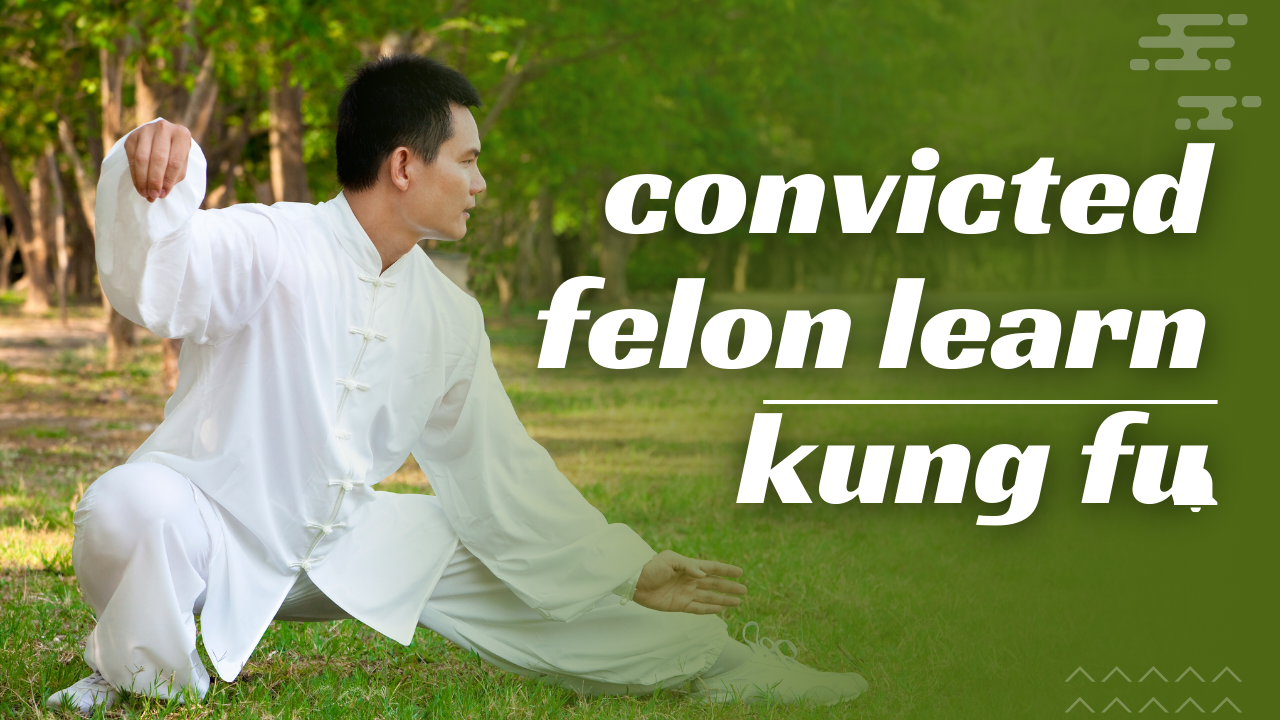The question, “Can a convicted felon learn kung fu?”, is not just about martial arts but also a broader inquiry into second chances, personal growth, and self-improvement. Martial arts, particularly kung fu, are often associated with discipline, physical fitness, and mental clarity. For those who have faced challenges such as a felony conviction, learning kung fu could provide a path to personal transformation.
In this comprehensive guide, we will delve into the feasibility of a convicted felon learning kung fu, the potential benefits, and the barriers they may encounter.
Can a Convicted Felon Learn Kung Fu? Understanding the Basics
The short answer is yes, a convicted felon can learn kung fu. There are no inherent legal restrictions that prevent someone with a criminal record from practicing martial arts. However, the journey is not without its challenges, both external and internal.
1. Legal and Societal Considerations
There are no laws that explicitly prohibit felons from learning or practicing martial arts, including kung fu. However, certain conditions might complicate this process:
- Probation or Parole Restrictions: Some probation terms may restrict participation in specific activities, particularly those involving weapons. This could affect training in kung fu if it involves traditional weapons.
- Community Perception: Martial arts schools might have reservations about accepting felons due to societal biases or concerns about liability.
2. Accessibility to Kung Fu Schools
Finding a kung fu school willing to accept a convicted felon may require effort. Many schools prioritize personal development over judgment, but it’s essential to approach with transparency and a willingness to commit to the discipline.
Benefits of Learning Kung Fu for Convicted Felons
Martial arts offer a range of physical, mental, and emotional benefits. For a convicted felon, these advantages can play a pivotal role in rehabilitation and reintegration into society.
1. Physical Fitness and Health
Kung fu training involves rigorous physical activity, which improves overall fitness, boosts cardiovascular health, and enhances flexibility. For someone recovering from the sedentary lifestyle often associated with incarceration, this can be transformative.
2. Discipline and Self-Control
Kung fu is rooted in discipline and self-control. Learning these principles can help individuals manage impulses and reactions, a crucial skill for someone striving to rebuild their life after a felony conviction.
3. Mental Clarity and Focus
The meditative aspects of kung fu promote mindfulness and stress relief. This can be particularly beneficial for felons dealing with anxiety, PTSD, or the emotional weight of their past actions.
4. Building Confidence and Self-Worth
Mastering martial arts techniques instills a sense of achievement. For a convicted felon, this can rebuild self-esteem and create a positive outlook on life.
5. Constructive Use of Energy
Kung fu provides an outlet for physical and emotional energy, reducing the likelihood of negative behaviors or decisions.
Challenges Felons Might Face While Learning Kung Fu
Despite its benefits, the journey to learning kung fu as a convicted felon may not be straightforward.
1. Stigma and Prejudice
Unfortunately, societal bias against individuals with criminal records can manifest in martial arts communities. Some instructors or schools might be hesitant to accept a felon as a student due to safety concerns or potential backlash from other students.
2. Financial Barriers
Kung fu classes often come with fees for training, uniforms, and equipment. For felons struggling with employment post-incarceration, these costs might be prohibitive.
3. Psychological Barriers
Feelings of shame, self-doubt, or fear of judgment might deter a felon from pursuing martial arts training. Overcoming these internal challenges is a crucial step.
4. Legal and Probationary Hurdles
As previously mentioned, certain legal restrictions or probation conditions could limit participation in martial arts, particularly if weapons training is involved.
How to Start Learning Kung Fu as a Convicted Felon
If you’re a convicted felon considering kung fu training, here’s a step-by-step guide to get started:
1. Research Schools and Instructors
Look for schools or instructors with a reputation for inclusivity and a focus on personal growth. Community centers and nonprofit organizations may also offer affordable or free martial arts programs.
2. Be Transparent About Your Past
While it’s not always necessary to disclose your criminal record, honesty can foster trust with your instructor. Many martial arts schools value commitment and a genuine desire to improve over a person’s past.
3. Start Small
If attending a formal school feels overwhelming, consider starting with online tutorials or beginner’s guides. This can help build confidence and familiarity with basic techniques.
4. Focus on Discipline and Commitment
Martial arts require dedication. Approach kung fu training with an open mind, a willingness to learn, and a commitment to improvement.
5. Seek Support
Engage with support groups or mentorship programs for felons. These networks can provide encouragement and resources to help you succeed in your martial arts journey.
Real-Life Success Stories: Felons Who Found Transformation Through Kung Fu
Numerous individuals with criminal records have turned their lives around through martial arts. For many, kung fu became a cornerstone of their rehabilitation and personal growth.
One such story involves a man who, after serving time for drug-related charges, joined a kung fu school that welcomed him with open arms. Over time, he not only mastered the art but also became an instructor, helping others find their path to self-improvement.
These stories highlight the potential for kung fu to act as a catalyst for change, proving that the answer to “Can a convicted felon learn kung fu?” is not only yes but also that it can be life-changing. FTMC
Can a Convicted Felon Learn Kung Fu? Why It Matters
At its core, this question reflects society’s broader debate about redemption and second chances. Martial arts, and kung fu in particular, embody principles that align perfectly with the values of personal growth, self-discipline, and respect for others.
Allowing felons to access opportunities like kung fu training acknowledges their potential for change and supports their journey toward becoming contributing members of society.
Conclusion: Breaking Barriers with Kung Fu
The path to self-improvement and rehabilitation is not an easy one, especially for those with a felony conviction. However, kung fu offers a unique opportunity to transform lives through its blend of physical discipline, mental clarity, and spiritual growth.
For a convicted felon, learning kung fu is not just about mastering martial arts techniques. It’s about reclaiming agency over their life, rebuilding self-worth, and proving that the past does not define the future.
So, can a convicted felon learn kung fu? Absolutely. And for many, it could be the first step toward a brighter, more empowered tomorrow.












